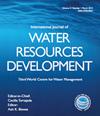Improving connectivity in water governance: the implementation of water cooperation mechanisms in disparate political and social contexts
IF 2.2
3区 环境科学与生态学
Q3 WATER RESOURCES
International Journal of Water Resources Development
Pub Date : 2022-05-19
DOI:10.1080/07900627.2022.2071848
引用次数: 2
Abstract
Water governance inevitably entails a complex bureaucratic matrix in which various functional agencies and territorially based administrative units operate at various institutional levels. These governmental actors have asymmetric rights and responsibilities, unbalanced powers, and divergent socio-economic interests, which may lead to water conflicts and governance failures. Likewise, non-governmental organizations, enterprises and community members do not necessarily concur with one another or with governmental actors on how water should be defined, used and/or transformed. The problems of disconnection and fragmentation can result in loosely institutionalized water governance systems, which may not be sufficiently equipped to render effective solutions to escalating tension and intensifying conflicts over water (Dellapenna et al., 2013; Gevers, 2018; Gupta et al., 2013; Wang et al., 2017). In response, various water cooperation mechanisms have been proposed at both international and national levels, focused on improving sustainability, efficiency, effectiveness and equality of water governance. Existing water governance literature has given much attention to the early stages of water cooperation mechanisms, such as the formulation of goals and discourses, deliberation over formal rules, and the establishment and reform of integrated water institutions (Gleick, 2003; Global Water Partnership, 2000; Schoeman et al., 2014). However, few studies have investigated how these mechanisms are implemented at the operational level and how various actors animate cooperation in practice (PahlWostl, 2020). Inadequate examination of the full policy cycle could obscure two important but understudied issues. On the one hand, various political, socio-economic and cultural factors may influence the process of implementation. It would be oversimplistic to analyse a water cooperation mechanism without closely examining its contextual configurations. In this sense, the implementation of water cooperation mechanisms is subject to complex interactions between those mechanisms and the contexts in which they operate, resulting in diverse outcomes that may not be fully consistent with policy goals (Schlager, 2016; Wang & Chen, 2021). On the other hand, the actors engaged by加强水治理的互联互通:在不同政治和社会背景下实施水合作机制
水治理不可避免地需要一个复杂的官僚矩阵,在这个矩阵中,各个职能机构和以领土为基础的行政单位在各个机构层面运作。这些政府行为体的权利和责任不对称,权力不平衡,社会经济利益分歧,可能导致水资源冲突和治理失败。同样,非政府组织、企业和社区成员在如何定义、使用和(或)改造水的问题上,不一定相互同意,也不一定与政府行为者达成一致。脱节和碎片化的问题可能导致松散的制度化水治理系统,这些系统可能不足以为不断升级的紧张局势和加剧的水冲突提供有效的解决方案(Dellapenna等人,2013;Gevers,2018;Gupta等人,2013年;Wang等人,2017)。为此,在国际和国家两级提出了各种水合作机制,重点是提高水治理的可持续性、效率、有效性和平等性。现有的水治理文献非常关注水合作机制的早期阶段,如目标和话语的制定、正式规则的审议以及综合水机构的建立和改革(Gleick,2003;全球水伙伴关系,2000年;Schoeman等人,2014)。然而,很少有研究调查这些机制是如何在操作层面实施的,以及各种参与者如何在实践中推动合作(PahlWostl,2020)。对整个政策周期的审查不充分可能会掩盖两个重要但研究不足的问题。一方面,各种政治、社会经济和文化因素可能影响执行进程。如果不仔细研究水合作机制的背景结构,就对其进行分析,那就过于简单了。从这个意义上说,水合作机制的实施受制于这些机制及其运作环境之间的复杂互动,导致不同的结果可能与政策目标不完全一致(Schlager,2016;王和陈,2021)。另一方面
本文章由计算机程序翻译,如有差异,请以英文原文为准。
求助全文
约1分钟内获得全文
求助全文
来源期刊
CiteScore
8.10
自引率
9.70%
发文量
23
审稿时长
1 months
期刊介绍:
International Journal of Water Resources Development is a policy and practice-oriented Journal that covers all aspects of water resources policy, management, development and governance. It is an interdisciplinary journal that focuses on water resources and their economic, financial, social and environmental-related impacts. Contributions which include the interdependences and inter-linkages between the water and the agricultural, energy, industrial and health sectors in both developed and developing countries, both at present and in the future, are welcome.

 求助内容:
求助内容: 应助结果提醒方式:
应助结果提醒方式:


